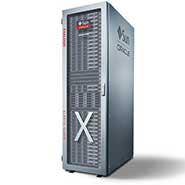Oracle's Next Move: Ellison To Intro Cloud-Based Exadata-As-A-Service At OpenWorld

Oracle plans next month to demonstrate its Oracle Database Cloud Exadata Service -- a new way for customers to run Oracle Database on-premise and also as a cloud-based service.
With the move, scheduled for next month's Oracle OpenWorld conference, Oracle expects to have nearly all the assets it needs in place for what it calls the "modern cloud."
A senior Oracle practice manager at a large Oracle solution provider told CRN on condition of anonymity that the last element in Oracle's "everything-as-a-service" is letting customers access the same database via on-premises and cloud-based solutions.
[Related: Oracle Q1 '16: Investment In Cloud Apps Is About To Really Pay Off]
"This is all pretty exciting," the solution provider said. "It plays into what Ellison has said, that computing should be a utility, and should be as easy as turning on a tap."
Oracle’s cloud offering appears to be on its way to being second to none, the solution provider said.
"I don’t think there will be any 'as-a-service' offering from another major tech OEM that will include as much as Oracle can," the solution provider said. "It will be unbeatable, and the widest as-a-service offering available from one source. Whether you like some parts or all of the red stack product categories, they are the only guys that will sell it all, either on-site, or the same thing on-demand, as a service."
Oracle Executive Chairman and Chief Technology Officer Larry Ellison spilled the beans about how the new Oracle Database Cloud Exadata Service offering fits Oracle's cloud strategy at last week's first fiscal quarter 2016 financial analyst conference call. He told analysts that Oracle will introduce Exadata-as-a-service at next month's Oracle OpenWorld conference.
The Oracle Exadata Database Machine is an appliance, or "engineered solution" in Oracle parlance, that combines the company's Oracle Database software with the company's server and storage hardware for a high-performance, highly available database platform. It features a scale-out architecture, industry-standard servers, flash storage and an internal InfiniBand fabric.
Oracle already offers Exadata-as-a-service in its cloud as well as the on-premises Oracle Exadata solution, Ellison said.
"You can run part of your database workload on-prem on that Exadata platform, part of that database workload in our cloud on that Exadata platform, and our management tool," he said. "When you are running your data center assets and our cloud assets, the person who is running that thinks that’s one pool of assets with one set of management tools that allow you to run your Exadatas and the Exadatas in the cloud together, move data [and] workloads back and forth."
Ellison, responding to an analyst question about how database-as-a-service fits in Oracle's broader Platform-as-a-Service (PaaS) offering, said the company is encouraging customers to move test and development to the Oracle cloud, meaning that Oracle watchers should stop looking at on-premises database and database-as-a-service separately.
"It’s really the sum of those that have to grow," he said. "The sum of those have to grow at the top line level and ... in terms of profitability. And we see that happening right now. So, we think PaaS, yes, some people will like to buy database as a service as opposed to running dev test on-prem, but we think that’s a good thing. We think we -- they get a more efficient service. They spend less. We get more."
Oracle Co-CEO Mark Hurd followed up, saying customers should not have to make a "binary" decision.
"We can deliver to you a capability in the cloud and we can go over the exact same capability to you on-premise and move those workloads back and forth, whether that’s database as a service, some dev test and then dev test in our cloud into your data center to run your production applications," Hurd said.
Hurd said that, after Ellison gives his opening Sunday night keynote at Oracle OpenWorld, the company will fundamentally have all of its software assets redone for the modern cloud.
"The ability to do what Larry said is not something that’s five years away, four years away, three years away," he said. "We can start delivering Exadata-as-a-service and these opportunities that Larry described now."
Ashish Ray, vice president of product management at Oracle, said Oracle Database Cloud Exadata Service will be demonstrated at next month's Oracle OpenWorld, but declined to comment on when it will be available.
Because Oracle Database Cloud Exadata Service is a hybrid offering that ties on-premises Exadata appliances with databases running on Exadata appliances in the Oracle Cloud, it will be attractive to three distinct groups of customers, Ray told CRN.
The first group includes customers who currently run Oracle Database on generic hardware who may be interested in moving the application to the Oracle Cloud to take advantage of the robustness and reliability of Exadata appliances, he said.
The second includes customers who already run Oracle Exadata on-premises and want to embark on the cloud but not work with cloud vendors running generic hardware. "The Oracle Cloud lets customers enjoy the same hardware integration, benefits and advantages of Exadata appliances when using the cloud," he said.
The third includes customers who have already embarked on their cloud strategy but who are not getting the performance of Exadata. Such customers can migrate data to the Oracle Cloud to get that performance, he said.
Oracle Database Cloud Exadata Service will be managed using the Oracle Enterprise Manager Cloud Control tool currently used to manage databases across multiple data centers and in the cloud, Ray said.
It will also take advantage of the Oracle Active Data Guard tool, which allows customers to run Oracle Database at a second site or the Oracle Cloud for disaster recovery reasons, Ray said. Oracle Active Data Guard also allows customers to run reports off the copy of data set up for disaster recovery, thereby offloading some of the processing from the on-premises primary copy, he said.
PUBLISHED SEPT. 22, 2015